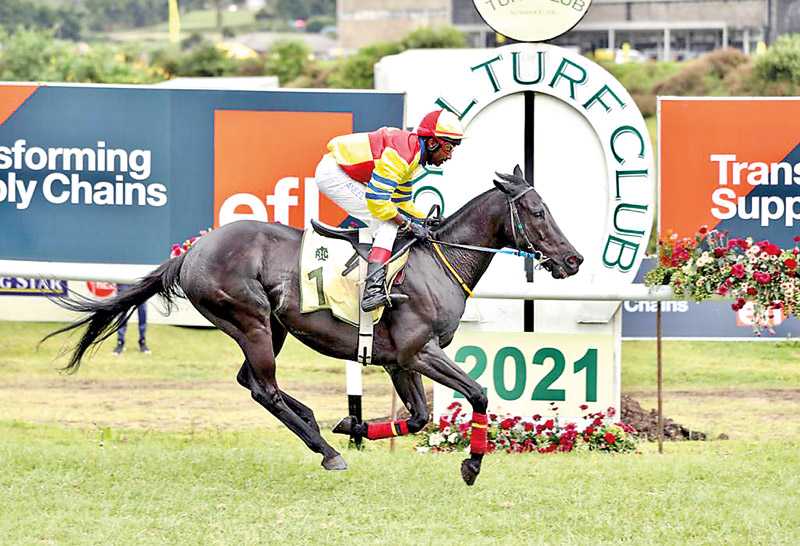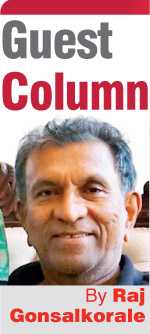Saturday Feb 28, 2026
Saturday Feb 28, 2026
Thursday, 13 May 2021 00:00 - - {{hitsCtrl.values.hits}}

While it is understandable for small traders to have made use of the opportunities they have to sell their wares and earn a living during Avurudu, it was an unconscionable phenomenon to have witnessed the crowds that thronged to Nuwara Eliya and places like Horton Plains and to have created a breeding ground for COVID. Conducting horse races certainly demonstrated that people were living by the adage ‘newa gilunath band chune’
The norms of society are the sum of our collective values and priorities – as society shapes us, we shape society. In addition to a sense of right and wrong for personal action, individuals possess a sense of right and wrong for collective action – what might be called social conscience. Individual conscience compels us to act morally in our daily lives, avoiding or helping to relieve the immediate suffering of others, whereas social conscience compels us to insist on moral action from the wider institutions of society and to seek the transformation of social structures that cause suffering – Myshele Goldberg, University of Strathclyde and the Centre for Human Ecology
 The wider society’s response and collective behaviour during the COVID pandemic in Sri Lanka, especially since the New Year period and in the last few weeks, has cast doubts on the values of our society and its lack of a social conscience as a society.
The wider society’s response and collective behaviour during the COVID pandemic in Sri Lanka, especially since the New Year period and in the last few weeks, has cast doubts on the values of our society and its lack of a social conscience as a society.
The battle against COVID has been left almost entirely to the Government and its many institutions, and hardly any civil society leaders, religious leaders, the media, and above all, political leaders outside of the government have appealed to what is left in us as a social conscience to behave responsibly and rationally to contain the spread of the COVID virus. It appears that the COVID containment issue has always been someone else’s responsibility and not that of the society itself.
Much of the publicity given and criticisms made, have been against the Government and its entities charged with managing the spread. Where there have been lapses, it is within everyone’s rights to level such criticisms. However, no government, this Government or any other, could totally manage the behaviour of its citizens, and in a democracy this is more so than in authoritarian States. Societal behaviour is a value based phenomenon and misbehaviour is a reflection on the worth of its values and a clear sign of a question mark on the social conscience of a society.
What is social conscience and why is it relevant, asks Myshele Goldberg. She says: “Conscience can be described as internalised values: a person’s intuitive ‘moral compass.’ While rational, philosophical, or religious arguments are often used as justifications, conscience itself is primarily emotional: we associate feelings of pleasure and pride with right action, and feelings of guilt and shame with wrong action. These emotions help to motivate choices and behaviour, playing an important role in the maintenance and transformation of social norms.”
Nuwara Eliya horse race revelry
While it is understandable for small traders to have made use of the opportunities they have to sell their wares and earn a living during Avurudu, it was an unconscionable phenomenon to have witnessed the crowds that thronged to Nuwara Eliya and places like Horton Plains and to have created a breeding ground for COVID.
Conducting horse races certainly demonstrated that people were living by the adage ‘newa gilunath band chune’ (let’s dance even if the ship sinks), symbolic of the Titanic catastrophe, which has now become a reality in the country. Besides the Nuwara Eliya revelry, neither did most ordinary folk observe any health guidelines relating to wearing masks or observing social distancing in this breeding ground and everywhere else in the country.
When idiocy overtakes logic and common sense, it says a lot about the state of mind of the Sri Lankan society during a critical stage of the pandemic in the country.
Whither, the Opposition?
The Opposition political parties and the phoenix that has risen from the dead, unlike the phoenix in mythology where a new phoenix rises from the ashes of its dead predecessor, symbolising rebirth, hope, renewal, progress, end of oppression, and eternity, the Sri Lankan phoenix in the form of the defeated UNP Leader is attempting to make political capital out of the plight of the pandemic without offering any hope to the people in the country.
It is ironic that this leader who led his party to the worst ever election defeat of any major political party in the post-independence history of the country, polling less than 300,000 votes in the entire country, and which failed to win enough votes to secure a seat in Parliament, is now set to enter Parliament from the back door.
If it comes to pass, it would be a macabre reward for ruining his party and it is a reflection of his values, that of his party and the values of the society in tolerating it. Neither the Government nor or other political parties, nor the media has thought it appropriate to highlight this moral and ethical degradation of values, assuming of course that there are any values left.
In regard to the responsibility of the society to safeguard themselves, their loved ones and others around them, neither has the Opposition leadership ever appealed to the people to behave in a more responsible manner and heed the advice of health authorities in the country. Instead, the focus has been solely on the Government action and inaction, and not once any appeals to the people of the country to observe the health guidelines and to act with caution and restraint.
No social conscience or moral compass
It is indeed depressing that a country that boasts of the influence of four great religions and boasts even more loudly of the influence of its Buddhist heritage, have not been able to develop a social conscience and a moral compass to chart and manage its behaviour
If we did have a worthwhile social conscience and then understood that social conscience, we could have made better choices to help shape society according to our values. This extends not just in respect of the COVID response but very broadly to the status of the society as a whole.
In Sri Lankan society today, one could question its value base and whether the real teachings of the age old religions are practiced as the teachers intended. Many would argue that superficial manifestations dominate society although few would be willing or are able to move away from such superficial manifestations.
The Sinhala Buddhist heritage is all but cultural and not true to the philosophy of the teachings. There would be Buddhists who chant the five precepts but hardly practice them. Ignorance and lip service surrounds the Metta, Karuna, Muditha and Upeksha tenants. They are either not understood and therefore not practiced or they have become discussion topics only for academic pursuits.
The world of Islam wishes to go back to what proponents term the “real teachings” of the Prophet, and Sri Lanka too has witnessed a movement in this direction. The Easter bombing in Sri Lanka, and the very recent massacre of school children in Afghanistan defy any belief that the Prophet would have endorsed such murderous activity in His name.
Myshele Goldberg goes on to say: “The words conscience and consciousness are often used interchangeably, but they are not the same. Consciousness, as used in expressions such as ‘raising consciousness,’ describes a person’s knowledge and awareness, and consciousness implies a process of value judgement, classifying situations broadly into right, wrong, or neutral.”
One can argue that there cannot be a consciousness without a conscience and that consciousness is the expression of one’s conscience. In the Sri Lankan context, if the behaviour of a significant segment of the wider society during the last few weeks, beginning with the Avurudu celebrations, and the behaviour of Opposition politicians, civil society leaders, religious leaders and other opinion makers including the media could be understood as an expression of their conscience, then it does raise a significant question about the values and value judgement of the Sri Lankan society.
The COVID pandemic is a health related issue and it needs to be directed by health authorities. Politicians of all hues, religious leaders, civil society leaders, the media, must appeal to the general public to heed the advice of health authorities, and assist the government of the day to manage the pandemic on the basis of health advice while doing the utmost to ensure that the lives and livelihoods of ordinary people of the country are safeguarded while acting within health guidelines parameters.
Dogs may bark while the caravan keeps moving, but the opinion leaders of the country should not bark like the dogs but instead assist to move the caravan forward for the benefit of the country.